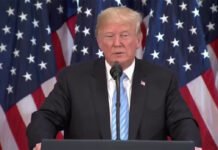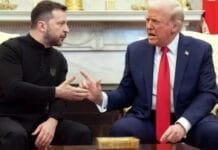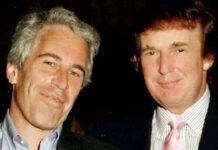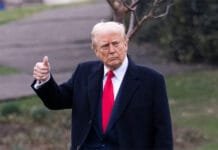
INVC NEWS
Washington, D.C. — President Donald Trump has called Saturday night’s U.S. airstrikes on three of Iran’s nuclear facilities a “spectacular military success,” warning of even more powerful attacks if Iran refuses to pursue peace. The airstrikes targeted key nuclear enrichment locations at Fordo, Natanz, and Isfahan, which U.S. officials say have been “completely obliterated.”
The White House said the goal of the strikes was to eliminate the growing nuclear threat posed by Iran, which Washington continues to label the “world’s number one sponsor of terrorism.”
Speaking from the White House flanked by top security and military leaders, Mr. Trump made clear that Saturday’s strike was just the beginning. “There will be either peace or there will be tragedy for Iran far greater than we have witnessed over the last eight days,” he said. “Remember, there are many targets left.”
Precision Strikes Hit Iran’s Core Nuclear Sites
The air assault began shortly after sunset, following a week of rising tensions between Iran, Israel, and the United States. According to U.S. defense sources, each site was selected based on its strategic importance in Iran’s uranium enrichment program.
Fordo, buried 300 feet underground and shielded by Russian-built anti-missile systems, is considered Iran’s most secure nuclear facility.
Natanz, located in Isfahan province, houses a vast network of centrifuges that operate in cascades to produce uranium enriched up to 60%.
Isfahan, south of Natanz, hosts advanced research labs, three Chinese-designed reactors, and thousands of nuclear scientists.
A U.S. intelligence official confirmed that all three facilities were targeted with precision munitions aimed at disabling enrichment capabilities without mass casualties.
Trump Thanks U.S. and Israeli Forces
During the address, President Trump thanked U.S. Armed Forces for executing the complex mission and extended gratitude to the Israeli military and Prime Minister Benjamin Netanyahu, saying Israel was alerted prior to the operation. Israel had already been carrying out strikes on Iranian military assets for over a week before Saturday’s U.S. intervention.
Vice President JD Vance, Secretary of State Marco Rubio, and Defense Secretary Pete Hegseth stood beside Trump during the live broadcast. Hegseth and Joint Chiefs Chairman Dan Caine are expected to provide a detailed military briefing on Sunday at 8 a.m. ET.
Iran Responds, Denies Impact
Iran’s Atomic Energy Organization confirmed the strikes but claimed they would not halt progress on its nuclear ambitions. Iranian state TV downplayed the damage, asserting that key facilities had already been evacuated. Officials also denied any structural damage to the Fordo uranium enrichment center.
Iran’s Foreign Minister Seyed Abbas Araghchi accused the U.S. of violating international law and the U.N. Charter, asserting Iran’s right to defend itself. “Iran reserves all options to protect its sovereignty and people,” he posted on X.
U.S. Intelligence Warns of Retaliation Threat
Prior to the strike, Iranian officials had warned that any U.S. military action would spark an “all-out war.” Following the operation, President Trump posted on Truth Social, saying, “Any Iranian retaliation WILL BE MET WITH FORCE FAR GREATER THAN WHAT WAS WITNESSED TONIGHT.”
U.S. officials are now on high alert for missile retaliation, cyberattacks, or regional escalation involving Iranian proxies like Hezbollah and Hamas.
Nuclear Concerns Mount as Enrichment Accelerates
According to the International Atomic Energy Agency (IAEA), Iran has significantly increased its stockpile of highly enriched uranium in recent months. The agency noted that Iran is the only non-nuclear weapon state currently producing uranium enriched to 60%—well above the 3%-5% needed for civilian energy use.
Before Israel’s first strike on June 13, the IAEA warned that Iran had accumulated enough nuclear material and, with approval from its Supreme Leader, could assemble a weapon within weeks.
President Trump disputed the earlier assessment of Director of National Intelligence Tulsi Gabbard, who testified in March that Iran wasn’t seeking a nuclear weapon. “She was wrong,” he said during the speech. Gabbard was among the officials monitoring the attack from the White House Situation Room.
World Watches as Tensions Reach Breaking Point
Saturday’s strike marks a significant turning point in U.S.-Iran relations and raises the risk of broader military conflict in the Middle East. With Iran warning of retaliation and the U.S. vowing more action, global attention remains focused on how Tehran will respond in the hours ahead.















